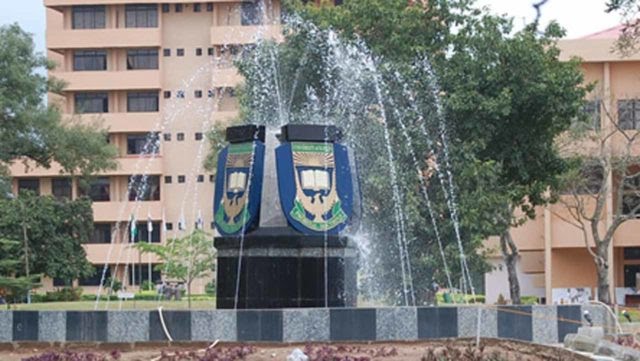Education
C’River sacks 12 principals, suspends six others over dubious charges

Cross River State Government has sacked 12 secondary school principals and suspend six others over illegal collection of money from students.
The state Commissioner for Education, Godwin Amanke, disclosed this while speaking with journalists in Calabar, the state capital,on Tuesday.
He also informed that 16 secondary school teachers and principals were accordingly transferred to rural areas as a punitive measure for imposing dubious charges on students.
“Tuition fee in the state is free but some Cross River teachers and principals connived alarmingly inflate other charges, which is not acceptable at all. We have suspended six principals so far over the unusual and inflated charges on students. We have given several queries to others involved in illegal charges and dealings, including bribing and acceptance of bribes to be posted to township schools,” he said.
While the names of the culprits were not made public, Amanke further disclosed that “these principals collect a hefty sum of N40,000 from each student as against N1,200. They collected fees for three terms upfront, claiming that many students do abandon their schools after taking WAEC exams. We are monitoring defaulting teachers and principals, and won’t hesitate to wield the big stick.”
Cultism, he stressed, remains a menace in schools in the state, and advised against this nefarious activity and other indecent acts.
Parents and guardians were further advised to do their bit and not leave the task of curbing cultism to the government alone.
Education
Check Your Name: UNILORIN Releases Updated NELFUND Refund List for 2024/2025 Students

Check Your Name: UNILORIN Releases Updated NELFUND Refund List for 2024/2025 Students
The University of Ilorin (UNILORIN) has released a new list of students eligible to apply for the 2024/2025 NELFUND refund, according to the UNILORIN Students’ Union (SU). Students who paid school fees before NELFUND disbursed funds directly to the university are now required to check their names and submit refund requests through the proper channels.
The official refund eligibility list has been shared in an Excel spreadsheet format and contains verified student details, including full name, matriculation number, department, and eligibility status. Students can search the file using their name or matric number to confirm their eligibility.
Those whose names appear on the list are instructed to fill the official refund form and submit supporting documents, including fee receipts and bank account details, to the Student Affairs Unit (SAU) or their respective Dean’s Office. The refund disbursement is gradual and ongoing, depending on NELFUND fund release schedules.
READ ALSO:
- Argungu Festival 2026 Highlights Peace, Stability, Economic Growth — Tinubu
- US Military Boosts Support for Nigeria’s Fight Against Insurgency With Ammunition, Troop
- Afenifere Calls for Immediate Take-Off of State Police as Terror Threats Rise in Yorubaland
For students whose names are not on the current list, they are advised to check their NELFUND portal status at portal.nelf.gov.ng and ensure all records are correctly verified. UNILORIN and the Students’ Union have also clarified that this is not the final list, as additional batches of eligible students may be added as verification continues.
Students are urged to act promptly, as following the prescribed procedures will ensure timely refund of fees paid in advance.
How to Check Your Eligibility
Students can confirm their eligibility by viewing the official list published by the university. To streamline verification, a table of students in the Department of Accounting and select departments is presented below.
| S/N | Matric Number | Student Name | Programme | Level | Department |
|---|---|---|---|---|---|
| 1 | 20/66MA093 | Johnson Babatunde Ogunwunmiju | B.Sc. Accounting | 400 | Accounting |
| 2 | 21/66MA002 | Zainab Oreoluwa Abdulrahmon | B.Sc. Accounting | 400 | Accounting |
| 3 | 21/66MA021 | Shukurat Oluwapelumi Adetunji | B.Sc. Accounting | 400 | Accounting |
| 4 | 21/66MA038 | Josephine Oluwateniola Akoki | B.Sc. Accounting | 400 | Accounting |
| 5 | 21/66MA049 | Vivian Member Aun | B.Sc. Accounting | 400 | Accounting |
| 6 | 21/66MA054 | Yusuf Olamilekan Babatunde | B.Sc. Accounting | 400 | Accounting |
| 7 | 21/66MA065 | Precious John Elijah | B.Sc. Accounting | 400 | Accounting |
| 8 | 21/66MA083 | Mariam Omowunmi Issa | B.Sc. Accounting | 400 | Accounting |
| 9 | 21/66MA088 | Toyosi Kolade | B.Sc. Accounting | 400 | Accounting |
| 10 | 21/66MA091 | Ayanfe Olaoluwa Makanjuola | B.Sc. Accounting | 400 | Accounting |
Note: The above table shows a partial list for illustration. The full list includes hundreds of students across various faculties and levels.
UNILORIN NELFUND Refund List 2025/2026
Check Your Name: UNILORIN Releases Updated NELFUND Refund List for 2024/2025 Students
Education
NELFUND Refutes UniAbuja Loan Diversion Claims

NELFUND Refutes UniAbuja Loan Diversion Claims
The Nigerian Education Loan Fund (NELFUND) has strongly refuted recent claims that officials of the University of Abuja (UniAbuja), including the vice‑chancellor and senior administrators, diverted or misappropriated student loan funds intended for indigent students.
In a detailed statement, NELFUND clarified that no verified evidence exists to support allegations that UniAbuja unlawfully withheld or diverted loan disbursements. The Fund said the speculation circulating in some media reports — which implicated the university’s vice‑chancellor, the Dean of Students’ Affairs, and other officials in the alleged diversion of multibillion‑naira funds — is unfounded and misleading.
The reports also suggested that UniAbuja failed to reimburse residual balances to students whose actual tuition fees were lower than the amounts disbursed by NELFUND on their behalf. In response, NELFUND maintained that its structured disbursement and reconciliation framework ensures that funds released for student loans are properly applied in line with its statutory mandate.
READ ALSO:
- NRC, Entertainers Finalise Plans for 2026 Valentine Train Ride
- 2027 General Elections: INEC Announces February 20 for Presidential Poll
- EFCC Nabs Three in Borno Over Viral ₦500 Naira Mutilation Video
Mrs. Oseyemi Oluwatuyi, NELFUND’s Director of Strategic Communications, emphasised that the Fund’s operations are governed by formal verification, compliance, and reconciliation protocols. According to her, loan funds are released through established institutional channels, and strict accountability mechanisms are in place to safeguard both student and institutional interests.
The Fund acknowledged that discrepancies or timing issues sometimes arise in the process of crediting student or institutional accounts, but said these are typically resolved through direct engagement with the relevant institutions, in accordance with due administrative processes.
“Where concerns arise regarding timelines of crediting student accounts or institutional reconciliation processes, NELFUND engages directly with the relevant institution to clarify and resolve such matters administratively and in accordance with due process,” the statement read.
NELFUND reiterated its commitment to transparency, accountability, and rigorous audit procedures, which include reliance on verified documentation and formal reconciliation mechanisms when addressing any issue related to its student loan disbursements.
The Fund also reaffirmed its dedication to protecting the interests of eligible Nigerian students and ensuring that all disbursements are applied lawfully and effectively to support access to tertiary education.
NELFUND Refutes UniAbuja Loan Diversion Claims
Education
Supreme Court Affirms Muslim Students’ Right to Worship at Rivers State University

Supreme Court Affirms Muslim Students’ Right to Worship at Rivers State University
The Supreme Court of Nigeria has ruled in favor of Muslim students at Rivers State University (RSU), affirming their constitutional right to practice Islam and perform religious activities on campus. The landmark judgment, delivered on February 10, 2026, closes a legal battle that has lasted for over a decade.
The ruling reinforces Section 38 of the 1999 Constitution (as amended), which guarantees freedom of thought, conscience, and religion for all Nigerians.
The Muslim Students’ Society of Nigeria (MSSN), Rivers State Area Unit, hailed the judgment as a historic affirmation of constitutional rights and the rule of law.
READ ALSO:
- Malami’s EFCC Trials Face Procedural Delay as Judge Steps Aside
- Umahi Vows to Quit if Road Project Fails Independent Quality Test
- NUFBTE Workers Occupy NAFDAC Lagos Office Over Sachet Alcohol Ban
The case traces back to 2012, when a mosque on the university campus was demolished, leaving Muslim students without a dedicated place of worship. The matter passed through the Federal High Court in 2013 and the Court of Appeal in 2017, before finally reaching the Supreme Court.
In a statement, the MSSN emphasized that the ruling is not a victory for one religion over another but a triumph for constitutionalism, equity, and justice. The society commended Muslim students for their discipline, resilience, and peaceful conduct throughout the legal process and acknowledged the efforts of its legal team and community leaders.
The MSSN called on Rivers State University management and relevant authorities to implement the ruling promptly by providing a dedicated and befitting place of worship for Muslim students on campus. The organization also urged students to respond with gratitude and maturity, emphasizing peaceful coexistence and mutual respect within the university community.
Experts believe this decision will have far-reaching implications for religious accommodation and inclusivity in public tertiary institutions across Nigeria.
Supreme Court Affirms Muslim Students’ Right to Worship at Rivers State University
-

 Education3 days ago
Education3 days agoCheck Your Name: UNILORIN Releases Updated NELFUND Refund List for 2024/2025 Students
-

 News3 days ago
News3 days agoOsogbo Sons and Daughters Mark 5th Anniversary with Awards, Political Undertones
-

 News15 hours ago
News15 hours agoSaudi Arabia Confirms Sighting of Ramadan Crescent, Fasting Begins Wednesday
-

 metro2 days ago
metro2 days agoUS Freezes Assets of Eight Nigerians Over Boko Haram, ISIL, Cybercrime Links
-

 News3 days ago
News3 days agoAfenifere Calls for Immediate Take-Off of State Police as Terror Threats Rise in Yorubaland
-

 metro3 days ago
metro3 days agoArgungu Festival 2026 Highlights Peace, Stability, Economic Growth — Tinubu
-

 News11 hours ago
News11 hours agoRamadan Begins in Nigeria as Sultan Confirms Crescent Sighting
-

 metro2 days ago
metro2 days agoTerror in Lagos Traffic: Cutlass Gang Unleashes Mayhem on Mile 12–Ketu Road















